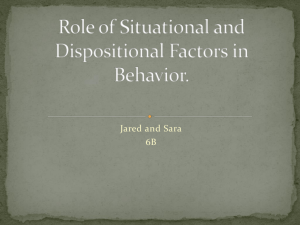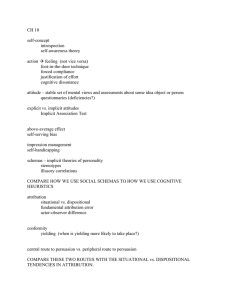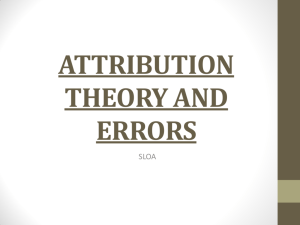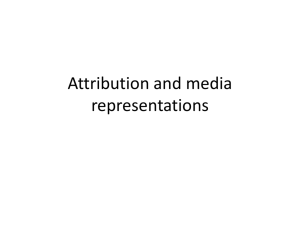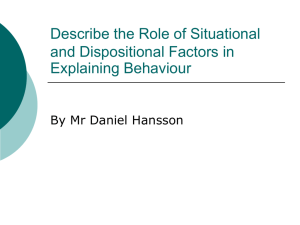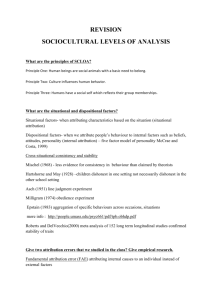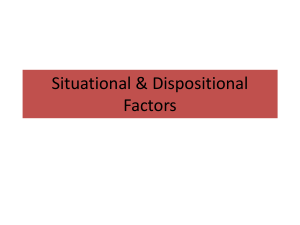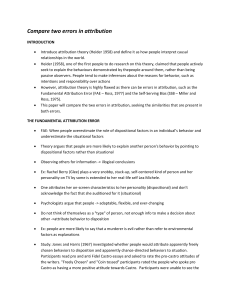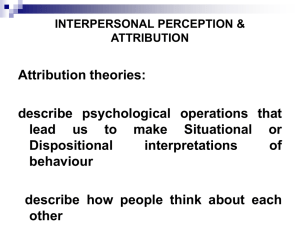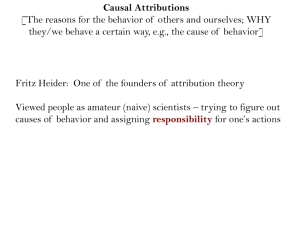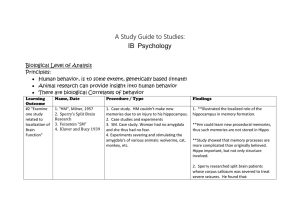situational & dispositional factors 2012
advertisement
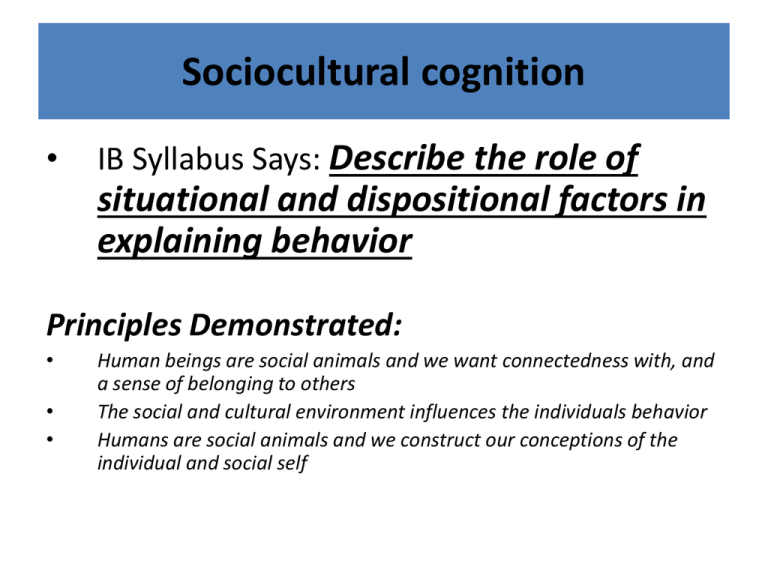
Sociocultural cognition • IB Syllabus Says: Describe the role of situational and dispositional factors in explaining behavior Principles Demonstrated: • • • Human beings are social animals and we want connectedness with, and a sense of belonging to others The social and cultural environment influences the individuals behavior Humans are social animals and we construct our conceptions of the individual and social self Attributions……… • Imagine you are sitting in a restaurant, waiting for your date to show up. He or she is late. • Most people would look for explanations of why he or she has not arrived yet….. What would these be?...... • Make a comprehensive list of reasons why……in a realistic way! Attribution Theory Attribution Theory • Social Cognition: how we think and understand social situations • Definition: Attribution is: “How people interpret and explain causal relationships in the world. The process of deciding what caused behavior.” • Heider (1958) was one of the first people to study attribution theory. He concluded that when people are trying to understand behavior, they are acting like naive psychologists. • We don’t simply passively observe our own and others actions, but actively seek to explain them. From observing peoples actions people make inferences about intentions and responsibility Situational & Dispositional Factors • People tend to make an attribution about behavior depending on whether they are performing it themselves or observing somebody else doing it. This is known as the actor-observer effect or The Fundamental Attribution Error (FAE) • When people discuss their own behavior they tend to attribute it to situational factors – that is, something to do with external factors – The social situation/ circumstances they were experiencing were responsible, the cause seems to be due to some external influence – i.e. environmental factors, other people, chance • When people observe someone else's behavior, they are more likely to attribute it to with dispositional factors – that is, something to do with personal (internal factors) The person performing the actions was responsible - The causes of the action are due to some aspect of the individual - i.e. their personality, ability, mood (The Fundamental Attribution Error (FAE) Attributions in the restaurant… 1. Look at the list of reasons you made earlier 2. Put a “D” next to the reason if it is dispositional and put a “S” next to the reason if it is situational 3. Which one do you have more of? Any cross cultural differences? 4. Review: Using a real life example explain the difference between situational and dispositional attributions Attribution Zimbardo’s et al. (1973) Stanford Prison Experiment (SPE) • This is a classic study which is still relevant today. • In 2004 U.S. Military personnel committed numerous abuses against prisoner held and the Abu Ghraib. • How could the prison guards act in such a way even when they say they would never do anything to harm another person. • He argues that ‘belonging needs’ (A key principle of the LOA) of the guards quickly turns into conformity to the ‘social norm’ of the group they were in • In his book The Lucifer Effect (2007) Zimbardo revisits the SPE in to examine the power of the situation. Attribution Zimbardo’s et al (1973) Stanford Prison Experiment (SPE) • Zimbardo believes that most people underestimate the influence of the situational factors on behavior. • There is a tendency for western (individualist) (Eastern –collectivistsituational more important) societies to attribute behavior to dispositional factors, and in everyday life it appears as if unacceptable behavior must come from something inside the person. • Zimbardo believes that people have a ‘good/evil’ dichotomy which emphasizes fixed dispositional factors in explaining behavior • Rather than viewing our personal attributes as fixed, Zimbardo believes that it is more realistic to think of our attributes in degrees, such as the degree of evil or honest the we show in different situations • According to Zimbardo (2007) “people and situations are usually in a state of dynamic tension. Although you probably think of yourself as having a consistent personality across time and space that is likely not be true” http://www.youtube.com/watch?v=OsFEV35tWsg Attribution Zimbardo’s (1971) Stanford Prison Experiment (SPE) Activity: • Read about the SPE and complete the key study sheet on the topic • Pay particular attention to the Essential Question: What does the study tell us about the role of situational and dispositional factors? (make reference to the results from the Comrey Personality Scales and Mood Adjective Self-Report) • We will then discuss this as a class SAQ: • (Define/Describe/Explain/Outline/State /Analyze/ Distinguish between) the role of situational and dispositional factors in explaining behavior.
